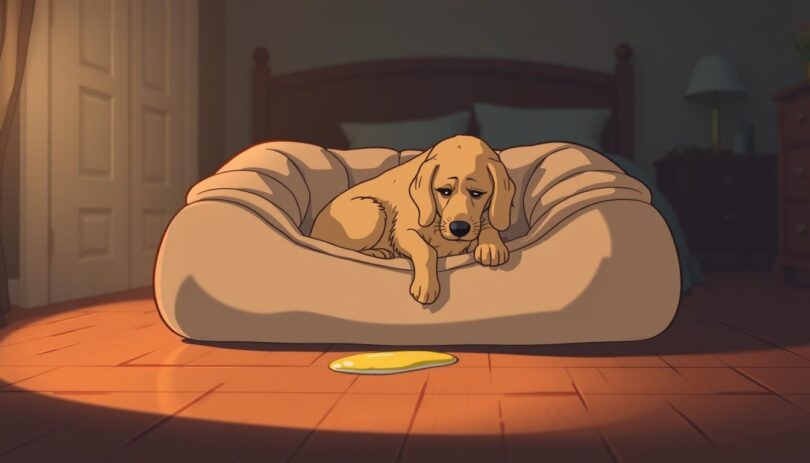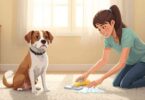What makes a faithful friend leave unpleasant surprises where you sleep? This is a perplexing situation experienced by many pet owners, and it is mostly misunderstood as defiance and spite. The truth is far more complex—and solvable.
Canine bed-wetting isn’t about revenge. It’s a red flag signaling deeper issues. It is usually caused by medical conditions such as urinary infections, incontinence that is related to age or digestive problems such as vomiting of white foam. There are also behavioral triggers like anxiety or territorial marking.
This behavior affects countless households. In a 2023 veterinary research, 40 percent of house-trained animals develop unforeseen accidents as a result of health or environmental changes. Immediate action prevents recurring habits that strain human-animal bonds.
Effective solutions start with identifying root causes. Is it a bladder infection? Stress from new routines? Or incomplete training? Every situation requires individual approaches involving veterinary treatment, behavioral changes, and environmental changes.
Understanding these factors helps owners address the problem systematically. Patience and professional guidance can solve most of the cases in weeks. This guide will take a look at what you can do to bring harmony-and dry bedding-back to your home.
Understanding Canine Urination Behavior and Environmental Influences
Pet owners often misinterpret elimination patterns as intentional misbehavior. Environmental cues and biological influences influence the interaction of animals with sleeping spaces. There are two phases of life that have their own problems, puppy development and elderly pets.
Puppy Accidents and Incomplete Potty Training
Young pups lack bladder maturity. A puppy at 12 weeks of age can be taken out to the bathroom once every 2-3 hours. Accidents on soft surfaces such as beds are usually found by owners who expect to have overnight control.
Inconsistent routines exacerbate the issue. Puppies associate elimination areas through repetition. Without proper potty-training techniques, they’ll choose convenient spots. Nighttime drowsiness reduces motivation to seek appropriate locations.
Senior Dog Incontinence and Cognitive Decline
Aging affects muscle control and mental sharpness. Weakened sphincter muscles allow urine leakage during sleep. Hormonal changes in spayed/neutered pets can worsen this.
Cognitive dysfunction syndrome mimics dementia in humans. Confused senior animals might forget decades of training. Common places such as beds become the victims of accidents even though there has been a habit.
Both scenarios demand tailored solutions. Puppies like a routine, whereas older pets should be given veterinary care and absorbent bedding. Recognizing these differences helps create effective management plans.
Deep Dive: why do dogs pee in your bed -Behavioral vs. Medical Causes
When a well trained pet uncharacteristically defecates in sleeping places, owners are presented with a bewildering conundrum. This behavior can be attributed to two different categories namely, biological malfunctions and psychological triggers that need different interventions.
When Biology Overrides Training
Urinary tract infections create burning sensations and urgency. Animals affected are unable to wait until they can have outdoor breaks and even when sleeping, accidents occur. Urinary stones and diabetes make the situation worse since they raise the frequency of urine production.
Spayed females often develop hormone-related incontinence. Weakened muscles let urine escape involuntarily, especially when relaxed. Other abnormalities that affect normal elimination control are neurological such as spinal injuries.
Emotional Overload and Security Seeking
Anxious pets gravitate toward owner-scented bedding during stressful events. Panic urination may occur when they are in the safest place like fireworks or thunderstorms. Separation distress manifests similarly when pets anticipate alone time.
Overexcitement during greetings can overwhelm young dogs. They have immature bladders that leak even though they know how to behave in the bathroom. These specific causes can be identified with the help of consistent routines and vet consultations.
Training and Preventative Measures for a Cleaner Sleeping Space
Eliminating urine in the sleeping place should be planned carefully and with patience. Proactive methods combine both a structured routine and environmental adaptations, which focus on both the physical needs and behavioral triggers.
Effective Potty Training and Supervision Strategies
Consistency forms the foundation of successful house training. Have set bathroom times after eating, napping, and playing. Look out for circling or sniffing- which are the usual indications that your friend has to go.
High-value treats and verbal praise should be used to reward the desired behavior as soon as it occurs. This reinforces the relationship between outdoor relief and good outcomes. In chronic cases, supervision with the help of a leash prevents the presence in restricted areas without supervision.
Adjusting the Home Environment to Limit Accidents
Physical obstructions such as baby gates or crates are temporary barriers to bedroom access which are used to solve underlying problems. Waterproof mattress covers protect bedding during the training phase.
Assign new sleeping areas using orthopedic mats not in the areas of past accidents. Take out dirty linens as soon as possible-enzymatic cleaners remove odors that can attract repeat incidences. These changes reduce temptations while reinforcing proper habits.
Special Considerations: Unique Challenges for Male and Female Dogs
Gender plays a surprising role in elimination habits. Biological differences create distinct patterns requiring tailored solutions. Owners who recognize these variations address problems more effectively.
Understanding Territorial Marking and Hormonal Influences in Males
Male pets that are intact tend to leave scent marks on soft surfaces. The act is more similar to social media updates as opposed to ownership claims. Small urine deposits mark familiar areas with their presence.
Neutering reduces this instinct by lowering testosterone levels. Studies show altered males mark 80% less frequently. Marking that does not go away following surgery can be a sign of anxiety or a medical problem that requires treatment.
Addressing Incontinence and Stress in Female Dogs
Spayed females frequently develop weakened bladder control. The decrease in the level of estrogen relaxes the muscles of the urethra, and leaks occur even at rest. Hormone therapy often restores muscle tone in these cases.
Unspayed companions face temporary incontinence during heat cycles. Accidents are increased under stress because stressed pets find a place of comfort such as beds. Veterinary-prescribed supplements and absorbent pads help manage these situations.
Both genders benefit from customized care. The males are responsive to behavior modification, whereas females require medical assistance in most cases. Knowing these needs enhances the relationship between pets and their families.
Practical Solutions and Product Recommendations for Managing Accidents
Redecorate your house using products that can address unforeseen messes. Intelligent decisions in the area of bedding and cleaning materials provide permanent solutions and do not compromise the comfort of pets or their owners.
Investing in Waterproof and Orthopedic Dog Beds
Orthopedic beds with removable covers offer dual benefits. They support aging joints while simplifying accident cleanup. Seek machine-washable designs with antimicrobial materials that are odor resistant.
Waterproof mattress protectors safeguard human bedding during training phases. High-quality options withstand repeated washing without losing absorbency. Pair these with absorbent pads for layered protection.
Enzymatic Cleaners and Effective Washing Techniques
Urine proteins are fully digested by specialized cleaners, eliminating odors that could encourage a recurrence. Wash stains first-cold water does not set proteins into fabrics.
For persistent odors, consider steam cleaning after enzymatic treatment. When it is possible, always air-dry objects in the sun since UV light has innate disinfecting properties. Addressing stress-related behaviors alongside cleaning routines creates comprehensive solutions.
Comparing costs reveals long-term savings. Good products will save on the cost of replacing destroyed mattresses or furniture. Give more priority to the items which have more than one use such as beds that are supportive and stain resistant.
Last thoughts and Future Action on a Dry, Happy Home
Resolving nighttime accidents involves teamwork between owners and professionals. Begin with a visit to the vet to exclude health-related problems such as bladder infection or age-related problems. Once the medical causes have been addressed, training changes should be combined with protective bedding approaches.
Consistency matters most during retraining. Stick to scheduled bathroom breaks and reward successes. Apply enzymatic cleaners to get rid of odors that may be tempting to repeat the same. Sleeping areas are covered with quality waterproof covers, which strengthen new habits.
Track progress and consult your vet if setbacks occur. When the strategies are in line with the needs of many pups, they improve within weeks. Early intervention will avoid long term trends, saving your mattress and bond.
Remember—this challenge doesn’t reflect training failures. With patience and tailored approaches, most households restore harmony. Buy quality products and have faith in the process, dry nights are coming.
FAQ
How can owners differentiate medical issues from behavioral problems?
Medical causes are often frequent urination and straining or blood in urine. There is a tendency of behavioral cases to align with territorial marking, significant changes in routines, or anxiety behavior. Monitor trends, and see a veterinarian to perform diagnostics such as urinalysis.
Do puppies outgrow bed-wetting habits?
The majority of puppies can be trained to control their bladder by 6 months with regular potty training and monitoring. Accidents are minimized by confinement methods, such as crates or puppy pens during sleeping time. Reward-based reinforcement accelerates progress.
What causes sudden urination on beds in adult dogs?
Unexpected accidents are usually caused by medical conditions such as urinary tract infections, bladder stones or incontinence due to age. It may also be caused by behavioral triggers such as separation anxiety, environmental stress or excitement urination. A veterinary exam helps rule out health concerns.










Leave a Comment